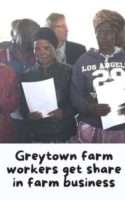Oral story telling is an African tradition as old as the continent itself. It serves many purposes. Generational wisdom gets passed through oral story telling. Just like how my mother taught me the art of storytelling at a young age. When I was growing up in Kuruman, a small town in the Northern Cape Province, my beloved mother, who had a sixth grade education and spoke very little English, was a master storyteller. Without fail, she narrated oral Setswana stories, known as ditlhamane, to her six children every single night. Like many Black children of my generation growing up in townships and rural towns in the ‘80s and early ‘90s in apartheid South Africa, lack of resources and political instability meant that many families improvised a lot to entertain themselves. While my mother was a skilled narrator, my aunt was a gifted actress and she would act out her stories when it was her turn to tell a story. Our home became a melting pot of storytelling sessions and performance art, as more and more children in the neighbourhood learned of the entertainment that my mother had created for us. As the number of children who came to our home grew, my mother asked each one of the children to prepare stories of their own and share them with everyone. Every one of us came up with our own stories to tell and there was laughter and song throughout the sessions. All this was done in our mother tongue, Setswana. I was hooked on stories, listening to them, narrating them and writing them ever since. We may have lacked physical books and a local library, but these oral stories were good enough to make me understand the power of stories to a curious child. It instilled in me the love of stories, books and writing. My home was the original reading club before reading clubs were a thing in the townships without us knowing.
Story telling is not confined to reading books and having an education. In Africa, stories lie with our elderly, who in the western education system are considered illiterate but are rich in indigenous wisdom and knowledge. A prime example of the warrior of indigenous knowledge is Ouma Katrina Esau, the 90-year-old great-grandmother who is a sole mother language speaker of the Nluu language in the world, but has find ways of preserving her language through oral storytelling. Stories can be told in song, like the incomparable Madosini, who told her story through music using Xhosa traditional instruments. Stories can be told anywhere and by anyone. Like the elderly people in a small Northern Cape town of Kathu, who formed a book club to tell stories to children at their local library.

Ouma Katrina Esau, photograph by Gregory Molale


May storytelling continue to thrive and live on in the hearts of the young and old! May those who continue to tell stories in whatever form multiply in leaps and bounds. May the sun, the moon and the stars carry stories from one part of the world to another so that we unite through stories!
Who were the storytellers in your life when you were younger, and how did their stories shape your worldview?
Share in the comments how you share your story now! #Storytelling #YoungAdultThoughts #WhatsYourStory
If you enjoyed this, read about the power of stories here.




